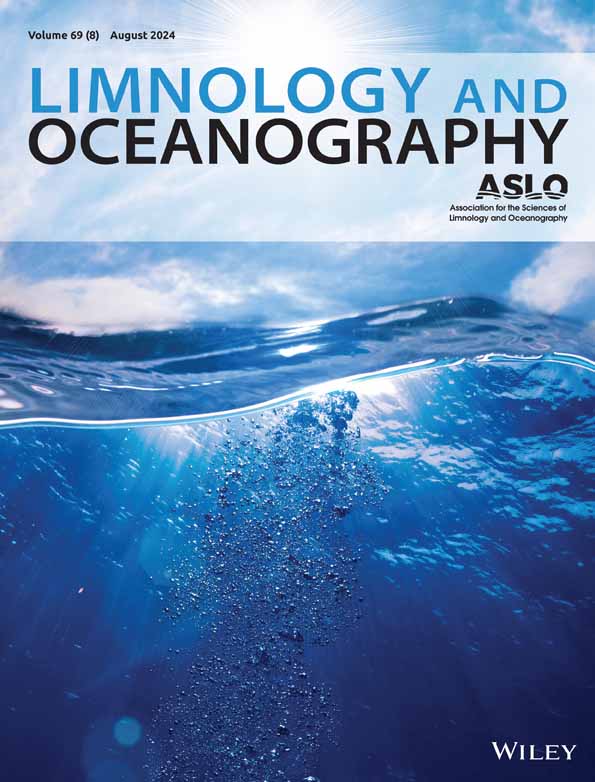浮游生物群落的今天和明天——多种全球变化驱动因素和海洋热浪的潜在影响
IF 3.7
1区 地球科学
Q1 LIMNOLOGY
引用次数: 0
摘要
在全球变化的背景下,海洋生物不仅受到非生物参数逐渐变化的影响,而且还受到越来越多的极端事件的影响,如热浪。然而,我们对热浪对海洋群落结构的影响仍然知之甚少,需要进行实验研究来测试热浪单独或与其他环境驱动因素结合的影响。在这里,我们进行了一个中生态实验来评估热浪对浮游生物群落的潜在影响,我们在现有和未来的环境条件下进行了实验。为了模拟未来的环境条件,我们根据IPCC对2100年的预测同时控制了温度和pH值,并根据欧洲沿海地区的预期条件控制了溶解的N: P比率。虽然我们没有观察到模拟热浪对浮游植物丰度的任何影响,但我们发现,未来的环境条件可能有利于较小的浮游植物物种,而额外的热浪可能特别有利于小型鞭毛虫和颗石藻。我们还观察到,未来的环境条件可能会降低浮游细菌、微型浮游动物和中浮游动物的丰度并改变它们的种类组成,而热浪可能会加剧这些影响。利用一种独特的方法来研究当前和未来环境条件下热浪对天然多营养海洋浮游生物群落的潜在影响,我们表明多种全球变化驱动因素的组合有可能扰乱海洋食物网的整个基础。本文章由计算机程序翻译,如有差异,请以英文原文为准。
Plankton communities today and tomorrow—potential impacts of multiple global change drivers and marine heatwaves
In the context of global change, marine organisms are subjected not only to gradual changes in abiotic parameters, but also to an increasing number of extreme events, such as heatwaves. However, we still know little about the influence of heatwaves on the structure of marine communities, and experimental studies are needed to test the impact of heatwaves alone and in combination with other environmental drivers. Here, we conducted a mesocosm experiment to assess the potential impact of heatwaves on plankton communities, which we did under ambient and future environmental conditions. To simulate future environmental conditions, we simultaneously manipulated temperature and pH based on IPCC predictions for 2100, and dissolved N : P ratios based on the conditions expected in European coastal zones. While we did not observe any effects of simulated heatwaves on phytoplankton abundances, we identified that future environmental conditions may favor smaller phytoplankton species and that additional heatwaves may especially favor small phytoflagellates and coccolithophores. We also observed that future environmental conditions may reduce the abundances and modify the species composition of bacterioplankton, microzooplankton, and mesozooplankton, and that heatwaves may exacerbate these effects. Using a unique approach to examine the potential impacts of heatwaves under current and future environmental conditions on a natural multi‐trophic marine plankton community, we show that the combination of multiple global change drivers has the potential to perturb the entire basis of marine food webs.
求助全文
通过发布文献求助,成功后即可免费获取论文全文。
去求助
来源期刊

Limnology and Oceanography
地学-海洋学
CiteScore
8.80
自引率
6.70%
发文量
254
审稿时长
3 months
期刊介绍:
Limnology and Oceanography (L&O; print ISSN 0024-3590, online ISSN 1939-5590) publishes original articles, including scholarly reviews, about all aspects of limnology and oceanography. The journal''s unifying theme is the understanding of aquatic systems. Submissions are judged on the originality of their data, interpretations, and ideas, and on the degree to which they can be generalized beyond the particular aquatic system examined. Laboratory and modeling studies must demonstrate relevance to field environments; typically this means that they are bolstered by substantial "real-world" data. Few purely theoretical or purely empirical papers are accepted for review.
 求助内容:
求助内容: 应助结果提醒方式:
应助结果提醒方式:


